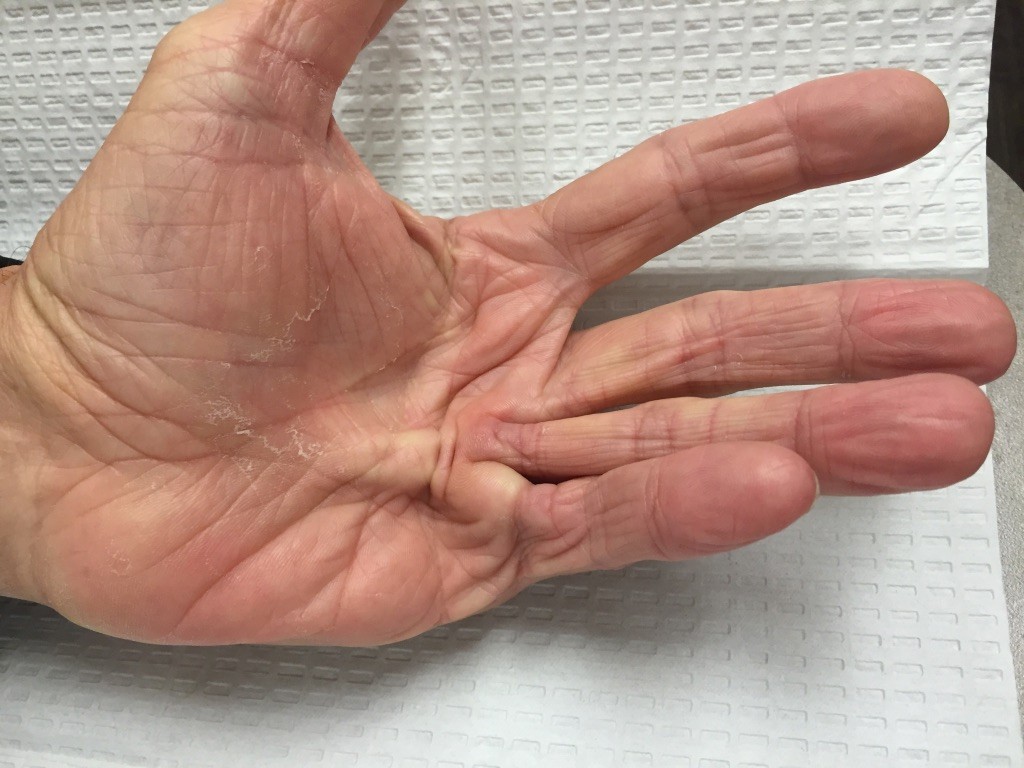Mysterious Bump Between Thumb and Index Finger? What You Need to Know
You're going about your day, maybe reaching for your phone or shaking someone's hand, when you feel it – a strange bump near the base of your thumb, nestled right where it meets your index finger. What is this unexpected visitor, and should you be worried? It could be a ganglion cyst, a common and usually harmless growth that tends to pop up near joints and tendons.
Imagine a tiny balloon filled with a thick gel-like fluid – that's the basic anatomy of a ganglion cyst. While they can occur in various locations, the back of the hand, particularly the area between the thumb and index finger, is a prime spot for these curious lumps. The exact reasons why ganglion cysts form remain somewhat of a mystery, but they're thought to be linked to things like joint or tendon irritation, injury, or even overuse. Think of it like this: your body, in its infinite wisdom (or perhaps slight overzealousness), creates a little fluid-filled sac in response to stress or strain.
Now, before you go into full-blown panic mode, it's important to note that ganglion cysts are typically benign. That means they're not cancerous and, in many cases, don't cause any pain or problems beyond their curious presence. However, depending on their size and location, these cysts can sometimes become bothersome. You might experience mild discomfort, a feeling of pressure or tenderness, or even some difficulty with hand movements, especially if the cyst is pressing on a nearby nerve.
So, what's a person to do about an uninvited ganglion cyst? If it's not causing you any trouble, the "wait and see" approach is perfectly valid. Many ganglion cysts disappear on their own over time, like a houseguest who finally got the hint. However, if your cyst is causing pain, limiting your hand function, or simply causing cosmetic concerns, there are options to explore.
Your doctor might recommend aspiration, a procedure where a needle is inserted into the cyst to draw out the fluid. While this can provide temporary relief, it's worth noting that ganglion cysts have a tendency to reappear, like a determined weed in a perfectly manicured lawn. In some cases, surgical removal of the cyst might be recommended, particularly if other treatments haven't been successful or if the cyst is causing significant issues.
Advantages and Disadvantages of Different Approaches to Ganglion Cysts
| Approach | Advantages | Disadvantages |
|---|---|---|
| Observation (Wait and See) | Non-invasive, no downtime, potential for cyst to resolve on its own | Cyst may not disappear, potential for growth or symptoms to worsen |
| Aspiration | Minimally invasive, relatively quick procedure, can provide temporary relief | Higher chance of recurrence, may require multiple treatments |
| Surgery | Highest chance of permanent removal | More invasive, requires recovery time, small risk of complications |
Frequently Asked Questions about Ganglion Cysts
Q: Are ganglion cysts dangerous?
A: Generally, no. Ganglion cysts are benign and not a cause for serious concern. However, it's essential to consult with a healthcare professional to rule out other conditions and discuss any concerns.
Q: Can I prevent a ganglion cyst from forming?
A: Since the exact cause of ganglion cysts is not fully understood, there's no guaranteed way to prevent them. However, avoiding repetitive hand movements and protecting your hands from injury may help reduce the risk.
Q: Will a ganglion cyst go away on its own?
A: Yes, many ganglion cysts resolve spontaneously without treatment.
Q: Is it safe to pop a ganglion cyst at home?
A: No, it's not recommended to attempt to drain or pop a ganglion cyst yourself. This can increase the risk of infection and other complications.
Q: When should I see a doctor about a ganglion cyst?
A: It's a good idea to consult with a doctor if you notice a lump or experience pain, tingling, or numbness near a joint, especially if it interferes with your daily activities.
Q: What types of doctors treat ganglion cysts?
A: Orthopedic surgeons, hand surgeons, or general practitioners can diagnose and discuss treatment options for ganglion cysts.
Q: What can I expect during a ganglion cyst aspiration?
A: Your doctor will numb the area, insert a needle into the cyst, and withdraw the fluid. The procedure is typically quick and well-tolerated.
Q: What is the recovery like after ganglion cyst surgery?
A: You'll likely have a splint or bandage on your hand for a short period after surgery. Your doctor will provide specific instructions on wound care, activity restrictions, and follow-up appointments.
Dealing with a ganglion cyst can be a bit unsettling, but armed with knowledge and the right approach, you can navigate this common health concern with confidence. Remember, while the information here provides a helpful starting point, it's crucial to consult with a healthcare professional for personalized advice, diagnosis, and treatment options. They can help determine the best course of action based on your individual needs and circumstances.
Ryan reynolds sold mint mobile for how much unveiling the 135 billion deal
Dominate your fantasy league week 6 wide receiver power rankings
Understanding llcs through real world examples














